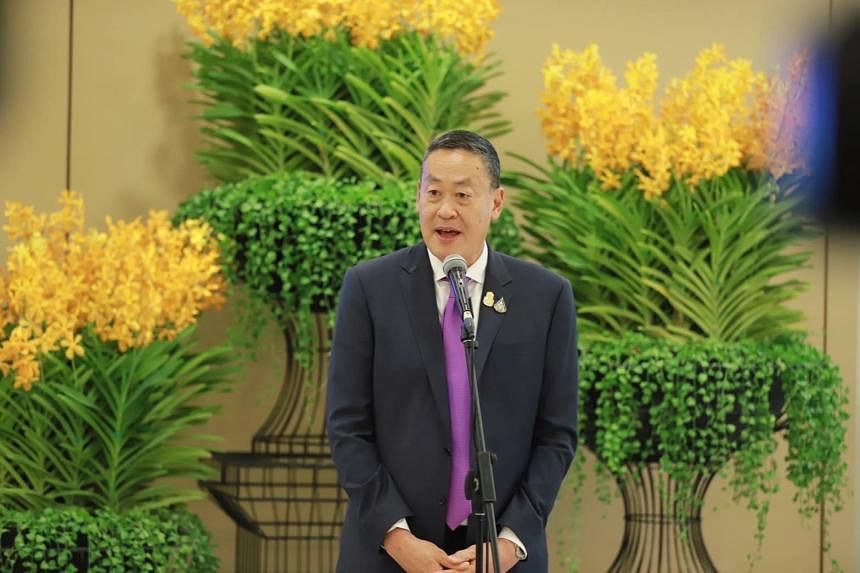DAVOS – The Philippines plans to propose a regulatory framework on artificial intelligence (AI) for the region when it serves as Asean chair in 2026, said the Speaker of its House of Representatives.
This would be based on the Philippines’ own draft legislation.
“We’d like to give as a gift to Asean a legal framework. Digitisation, even in our economic policy, is very, very much right up there as a priority,” said Speaker Martin Romualdez during a panel discussion at the World Economic Forum’s (WEF) annual meeting in Davos, Switzerland, on Jan 18.
“Alongside that is cyber security and the concomitant concerns and issues, (such as) generative artificial intelligence, a field that needs a lot of support and regulation.
“We feel that in Asean, we can capitalise (on) and optimise these developments, but within a framework of regulatory support.”
The regulatory landscape for AI is currently fragmented, and there have been calls to develop common rules among countries.
In December, the European Union reached a political deal on a law to regulate AI, but the details are still being finalised.
Mr Romualdez also said he wants to set up an Asean Parliament, like the one in the European Union, but did not elaborate.
He invited the event participants to attend a WEF roundtable for chief executives in Manila in March, to be hosted by President Ferdinand Marcos Jr.
Mr Romualdez, Thailand’s Prime Minister Srettha Thavisin and Vietnam’s Prime Minister Pham Minh Chinh also spoke at the Learning From Asean panel discussion to emphasise the grouping’s strengths and agency to investors and politicians.
Mr Chinh expressed hope that unity would prevail as the region becomes a hot spot for rapid and sustainable growth.
Meanwhile, Mr Srettha said he envisioned a “seamless Asean” as a single destination for foreign investors in five to 10 years, even as each country presented its own advantages in the eyes of foreign investors. “If you come to Thailand, then you won’t need a visa for Cambodia or Vietnam.”
He added that all countries could have the same tax incentives.
The key factors for Asean’s success, the speakers highlighted, are its leaders’ ability to work closely with each other and towards a common vision of shared prosperity, as well as their emphasis on maintaining relations with both the United States and China.
“It is kind of unique that I can just pick up the phone and WhatsApp (other leaders),” said Mr Srettha.
“Today, I just called (Cambodian PM) Hun Manet and we had a quick chat without having to prepare for two months. It is a fast-changing world.”
“I wish President Xi Jinping and President (Joe) Biden could do the same,” he added.
Asean’s remarkable growth, despite the pandemic, geopolitical tensions and protectionist measures, formed the backdrop for the discussions.
At the start of the session, it was pointed out that the region of 660 million people, with a nominal gross domestic product of US$3.6 trillion (S$4.8 trillion), is projected to be the world’s fourth-largest trading bloc by the end of the decade.
While global trade grew by 24 per cent between 2017 and 2021, it grew 33 per cent in Asean and there are higher hopes going forward as global firms bring Asean deeper into their supply chains, noted panel moderator Julia Chatterley, a CNN Business news anchor.
Perhaps the strongest endorsement of the region’s potential came from the World Trade Organisation’s (WTO) director-general Ngozi Okonjo-Iweala, who was also on the panel.
She said: “We think, at the WTO, the Asean group of countries is a poster child for the open multilateral trading system.
“They are an example of using international trade to create jobs and enhance people’s living standards (and) reduce poverty. They have done it so well.”
The trick, she said, is that Asean countries have been able to diversify their economies and build trust. “Trust is key when you are going to negotiate agreements.”
Mr Chinh also said during a separate session, focused on opportunities in Vietnam, that the country wants to become a developed nation by 2050, with high-income opportunities for their people.
For this, Vietnam’s focus is to build a “socialist-oriented democracy, develop a rule-of-law state and ensure a socialist-oriented market economy, with a role for the government”, he said.


